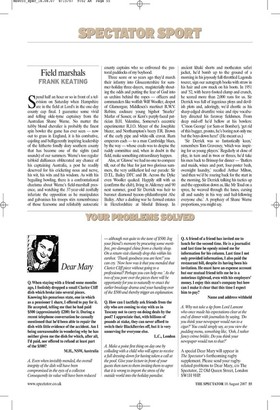Field marshals FRANK KEATING
Spend half an hour or so in front of a television on Saturday when Hampshire are in the field at Lord's in the one-day county cup final. I guarantee some vivid and telling olde-tyme captaincy from the Australian Shane Warne. No matter the tubby blond chevalier is probably the finest spin bowler the game has ever seen — now out to grass in England, it is his combative, cajoling and belligerently inspiring leadership of the hitherto fondly dozy southern county that has become one of the sights (and sounds) of our summers. Warne's too regular tabloid dalliances obliterated any chance of his captaining Australia, a post he readily deserved for his cricketing nous and nerve, his wit, his wits and his wisdom. As with his beguiling bowling, there is a confrontational charisma about Warne's field-marshall presence, and watching the 37-year-old zestfully infuriate the opposition as he manipulates and galvanises his troops stirs remembrance of those fearsome and relishably autocratic county captains who so enlivened the pastoral paddocks of my boyhood.
Three score or so years ago they'd march their infantry into Gloucestershire for summer-holiday three-dayers, magisterially shouting the odds and putting the fear of God into us urchins behind the ropes — officers and commanders like wolfish WIlf Wooller, despot of Glamorgan; Middlesex's martinet R.W.V. Robins; cocksure young bigshot 'Snarler' Marlar of Sussex; or Kent's purply-faced patrician B.H. Valentine, Somerset's eccentric experimenter RIO. Meyer of the Josephite blazer, and Northampton's beery ER. Brown of the curly pipe and white-silk cravat. Rum emperors each — to a man Cambridge blues, by the way — whose credo was to despise the ruddy committee and, when in doubt in the field, make something extraordinary happen.
Alas, at `Glawse' we had no one to compare till, out of the blue for just two glorious summers, the very unlikeliest led our parade: Sir D.T.L. Bailey DFC and Bt. Across the Dyke even Wooller quaked. Happily still with us (confirms the club), living in Alderney and 90 next summer, good Sir Derrick was heir to baronet diamond tycoon–philanthropist Abe Bailey. After a dashing war he farmed estates in Herefordshire at blissful Brinsop. In ancient khaki shorts and motheaten safari jacket, he'd bomb up to the ground of a morning in his joyously full-throttled Lagonda tourer, sign our autograph books with straw in his hair and cow muck on his boots. In 1951 and '52, with heavy-footed clump and crunch, he scored more than 2,000 runs for us. Sir Derrick was full of ingenious ploys and devilish plots and, adoringly, we'd chortle as his sharp-edged drumfire voice and ripe vocabulary directed his faraway fieldsmen. From deep mid-off he'd bellow at his bowlers: 'C'mon George' (or Sam or Bomber), 'get rid of this bugger, pronto, he's boring not only me but the boys down here!' (He meant us.) 'Sir Derrick was so fantastically keen,' remembers Tom Graveney, 'which was inspiring for us young players.' Regularly at close of play, in turn and in twos or threes, he'd take his men back to Brinsop for dinner — 'Butlers and maids, wines and port, four-poster beds, overnight laundry,' recalled Arthur Milton, 'and then we'd be roaring back for the start in the morning, Sir Derrick talking his tactics up and the opposition down as, like Mr Toad on a spree, he weaved through the lanes, cursing all and sundry in his way and hail-fellowing everyone else.' A prophecy of Shane Warne proportions, you might say.












































 Previous page
Previous page